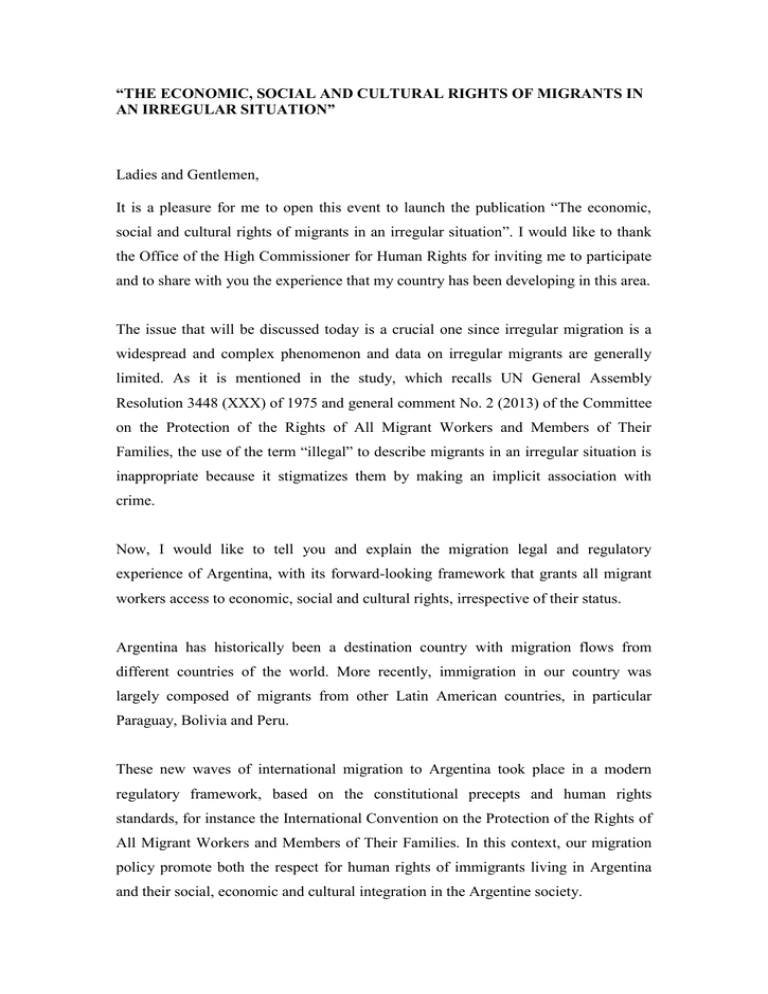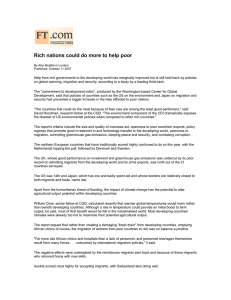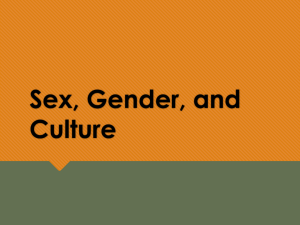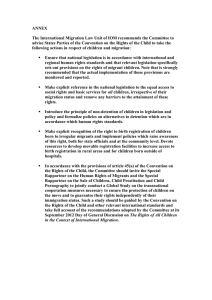“THE ECONOMIC, SOCIAL AND CULTURAL RIGHTS OF MIGRANTS IN
advertisement

“THE ECONOMIC, SOCIAL AND CULTURAL RIGHTS OF MIGRANTS IN AN IRREGULAR SITUATION” Ladies and Gentlemen, It is a pleasure for me to open this event to launch the publication “The economic, social and cultural rights of migrants in an irregular situation”. I would like to thank the Office of the High Commissioner for Human Rights for inviting me to participate and to share with you the experience that my country has been developing in this area. The issue that will be discussed today is a crucial one since irregular migration is a widespread and complex phenomenon and data on irregular migrants are generally limited. As it is mentioned in the study, which recalls UN General Assembly Resolution 3448 (XXX) of 1975 and general comment No. 2 (2013) of the Committee on the Protection of the Rights of All Migrant Workers and Members of Their Families, the use of the term “illegal” to describe migrants in an irregular situation is inappropriate because it stigmatizes them by making an implicit association with crime. Now, I would like to tell you and explain the migration legal and regulatory experience of Argentina, with its forward-looking framework that grants all migrant workers access to economic, social and cultural rights, irrespective of their status. Argentina has historically been a destination country with migration flows from different countries of the world. More recently, immigration in our country was largely composed of migrants from other Latin American countries, in particular Paraguay, Bolivia and Peru. These new waves of international migration to Argentina took place in a modern regulatory framework, based on the constitutional precepts and human rights standards, for instance the International Convention on the Protection of the Rights of All Migrant Workers and Members of Their Families. In this context, our migration policy promote both the respect for human rights of immigrants living in Argentina and their social, economic and cultural integration in the Argentine society. In 2004 the National Congress approved the Migration Act No. 25,871 that laid the foundations of a new immigration policy in our Country. This law represents an historical policy precedent in the integration process of the Southern Common Market or Mercosur, because with the adoption of the "Criterion of Nationality", all citizens of States Parties of Mercosur are guaranteed the right to reside in Argentina. The Migration Act embodies the spirit of international human rights treaties ratified by Argentina. In this sense, it legislatively establishes the right to migrate as an inalienable right of the people, and the right to family reunification. Likewise, it puts emphasis on ensuring the integration and economic and social development of foreigners in Argentina recognizing the rights of migrants under the same conditions enjoyed by Argentine citizens, particularly those relating to social services, public goods, health, education, justice, labor, employment and social security. Finally, the Migration Act reverses the criterion related to the settlement of foreigners. While in the previous legislation the emphasis was placed on the policing and control of irregular immigrants, the new law explicitly favours their regularization. The Migration Act was regulated in 2010 after an extensive work by an unprecedented advisory committee created ad hoc due to the complex nature of the rule contained therein. The final text of the regulation is the result of a joint work between the State and human rights organizations, religious institutions, and international organizations such as the International Organization for Migration (IOM) and the UN High Commissioner for Refugees (UNHCR). Based on the fundamental guidelines of migration policy established by the Constitution, international treaties to which we belong and above legislation, the Argentine Government approved Decree No. 836/2004 and 578/2005 that created and gave implementation to the National Migrant Regularization Program "Patria Grande". These decrees aimed at implementing measures to ensure the inclusion and integration of migrants from States Parties and Partners of Mercosur (Brazil, Bolivia, Colombia, Chile, Ecuador, Paraguay, Peru, Uruguay and Venezuela) through a facilitated access to residence. The purpose of this measure was to move from a restrictive to a realistic and open migration policy, capable of accompanying the progress of the process of the Mercosur regional integration. The Patria Grande Programme was born as an instrument aimed at facilitating the regularization of migrants and soon became a state policy. Although this Program ended, it generated facilities that still exist and function, since all irregular immigrants of the Region can smoothly regularize their status. Between 2004 and 2011, through Patria Grande and the admission of new migrants to the Country, Argentina granted more than 1 million residence permits. In this context, we can say that none of the fears and prejudices put forward by opponents of this broad and generous policy has materialized. During the aforementioned period, unemployment fell from 20% to 7.8%, underemployment was reduced by a similar proportion, poverty rates fell from 54% to 13.2% and extreme poverty fell from 27% to 3.5%. These figures clearly demonstrate that migration flows accompanied by active social policies promote and benefit the economy. Moreover, in 2003 the criminal sentences against foreigners accounted for 28.03% of the total, while in 2009 they were 28.5%: these similar data demonstrate that mass regularization did not translate into an increase of crime associated with immigrants. In conclusion, the Argentina Republic today can offer a case study of an open and successful migration policy. Policies based on border control and immigration restrictions are ineffective because they do not stop migration flows; on the contrary, they lead to the legal marginalization of millions of individuals, and increase the security risks, and indirectly fuel the trafficking in persons. Finally, it must be highlighted that an open migration policy is not enough if it is not accompanied by active public policies to ensure effective respect for the rights of migrants and their integration into the society in which they choose to live. The migration policy paradigm shift in Argentina led to the establishment of a new strategic vision of our Nation: Argentina understands that the respect for human rights of migrants and their families is a key element to foster their full integration, which in turn contributes to the economic, social and cultural development.



